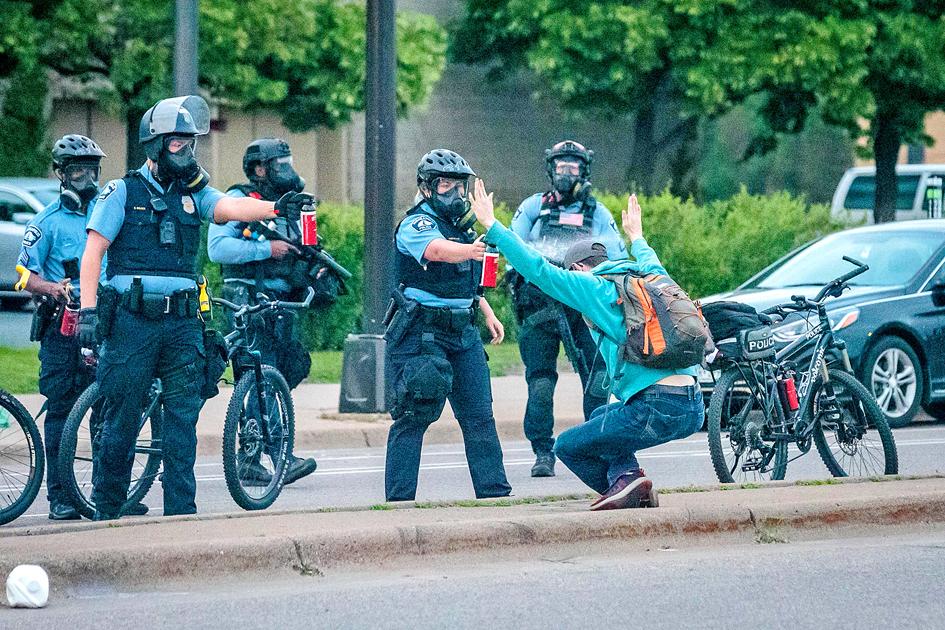Minneapolis city councilors on Sunday pledged to dismantle and rebuild the police department, after the death in custody of George Floyd sparked nationwide protests about racism in law enforcement, pushing the issue onto the national political agenda.
Floyd died on May 25 when white Minneapolis police officer Derek Chauvin pressed his knee on the unarmed black man’s neck for nearly nine minutes. Chauvin has been charged with second-degree murder and was to appear in court yesterday.
The prospect that Minneapolis could abolish its police force altogether would have seemed unthinkable just two weeks ago.

Photo: AFP
Nine members of the 13-person city council pledged to do away with the police department in favor of a community-led safety model, though they provided few details.
“A veto-proof majority of the MPLS City Council just publicly agreed that the Minneapolis Police Department is not reformable and that we’re going to end the current policing system,” Minneapolis Councilor Alondra Cano said on Twitter.
“We committed to dismantling policing as we know it in the city of Minneapolis and to rebuild with our community a new model of public safety that actually keeps our community safe,” Minneapolis Council President Lisa Bender told CNN, after a majority of councilors committed to the effort.
However, Minneapolis Mayor Jacob Frey is against getting rid of the department, and Bob Kroll, head of the city’s police union, appeared on stage last year with US President Donald Trump.
The vow by the majority of councilors came a day after Frey was booed at and asked to leave a “Defund the Police” rally.
He later told reporters he supported “massive structural reform to revise this structurally racist system,” but not “abolishing the entire police department.”
On Sunday, protesters in cities — including Washington, New York and Winter Park, Florida — began focusing their outrage over the death of Floyd onto demands for police reform and social justice.
In Seattle, a person was shot and wounded after a man armed with a gun drove into a crowd of protesters. The suspect was arrested, police said.
US congressional Democrats were yesterday to unveil a sweeping package of legislation to combat police violence and racial injustice.
The proposal is expected to ban police chokeholds and racial profiling, require nationwide use of body cameras, subject police to civilian review boards and abolish the legal doctrine known as qualified immunity, which protects police from civil litigation, sources said.
“It is time for police culture in many departments to change,” Congressional Black Caucus Chairwoman Representative Karen Bass told CNN on Sunday.
She added that she hoped the wave of largely peaceful protests seen across the US over the past two weeks would increase pressure on lawmakers to act.

TRAGEDY STRIKES TAIPEI: The suspect died after falling off a building after he threw smoke grenades into Taipei Main Station and went on a killing spree in Zhongshan A 27-year-old suspect allegedly threw smoke grenades in Taipei Main Station and then proceeded to Zhongshan MRT Station in a random killing spree that resulted in the death of the suspect and two other civilians, and seven injured, including one in critical condition, as of press time last night. The suspect, identified as a man surnamed Chang Wen (張文), allegedly began the attack at Taipei Main Station, the Taipei Fire Department said, adding that it received a report at 5:24pm that smoke grenades had been thrown in the station. One man in his 50s was rushed to hospital after a cardiac arrest

SAFETY FIRST: Double the number of police were deployed at the Taipei Marathon, while other cities released plans to bolster public event safety Authorities across Taiwan have stepped up security measures ahead of Christmas and New Year events, following a knife and smoke bomb attack in Taipei on Friday that left four people dead and 11 injured. In a bid to prevent potential copycat incidents, police deployments have been expanded for large gatherings, transport hubs, and other crowded public spaces, according to official statements from police and city authorities. Taipei Mayor Chiang Wan-an (蔣萬安) said the city has “comprehensively raised security readiness” in crowded areas, increased police deployments with armed officers, and intensified patrols during weekends and nighttime hours. For large-scale events, security checkpoints and explosives

A car bomb killed a senior Russian general in southern Moscow yesterday morning, the latest high-profile army figure to be blown up in a blast that came just hours after Russian and Ukrainian delegates held separate talks in Miami on a plan to end the war. Kyiv has not commented on the incident, but Russian investigators said they were probing whether the blast was “linked” to “Ukrainian special forces.” The attack was similar to other assassinations of generals and pro-war figures that have either been claimed, or are widely believed to have been orchestrated, by Ukraine. Russian Lieutenant General Fanil Sarvarov, 56, head

PUBLIC SAFETY: The premier said that security would be tightened in transport hubs, while President Lai commended the public for their bravery The government is to deploy more police, including rapid response units, in crowded public areas to ensure a swift response to any threats, President William Lai (賴清德) said yesterday after a knife attack killed three people and injured 11 in Taipei the previous day. Lai made the remarks following a briefing by the National Police Agency on the progress of the investigation, saying that the attack underscored the importance of cooperation in public security between the central and local governments. The attack unfolded in the early evening on Friday around Taipei Main Station’s M7 exit and later near the Taipei MRT’s Zhongshan